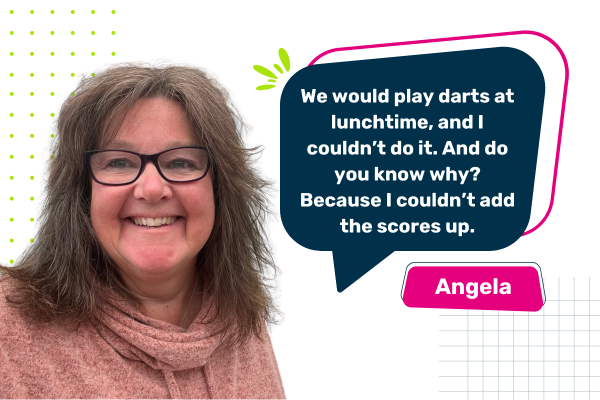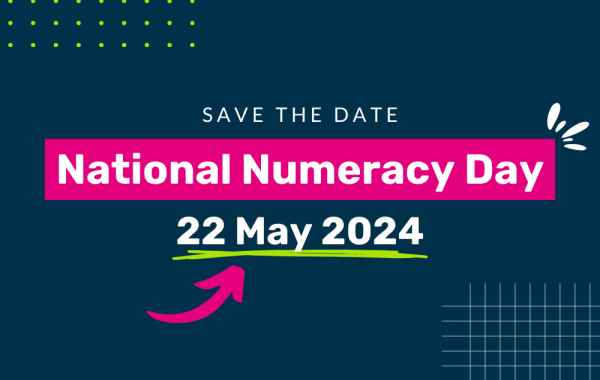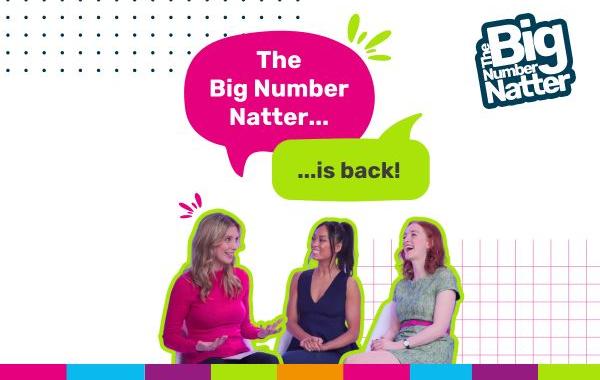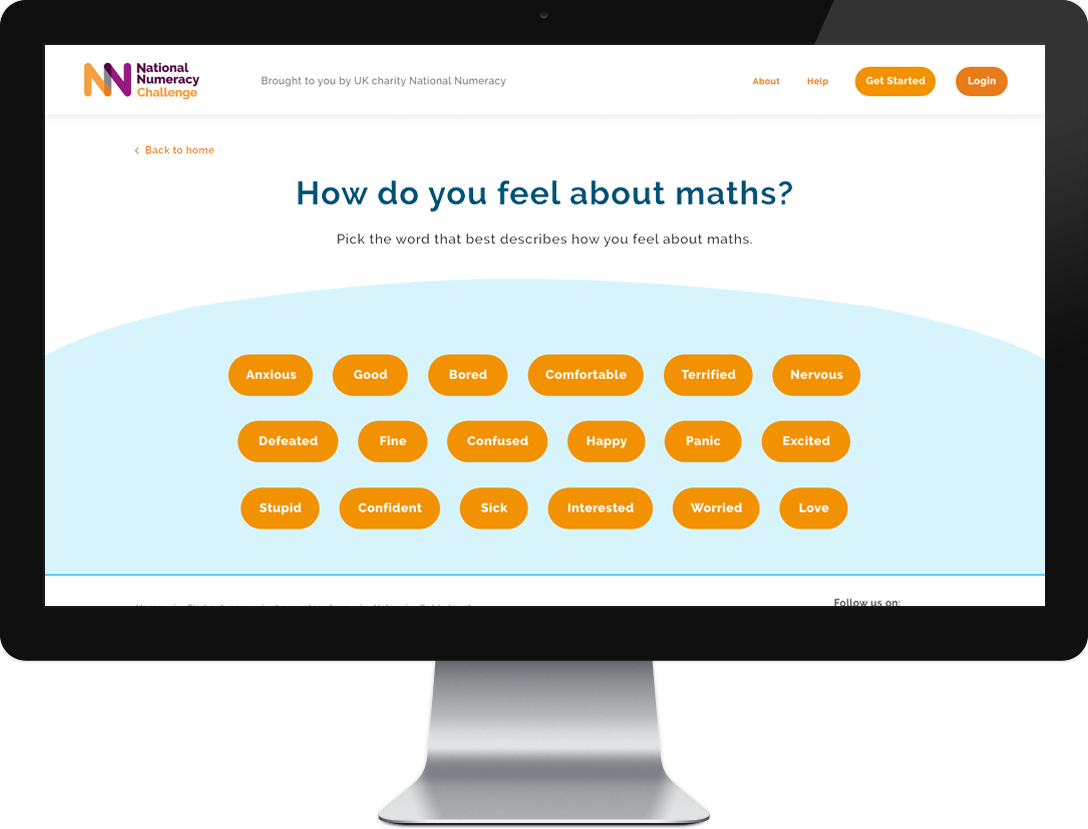Avoiding maths at school
If you asked me how I used to feel about maths, I’d just say “No. No, I don't do it.” It was as simple as that.
It was avoidance. That was how I got through my life. Anything I could do to avoid doing maths, I did. It was that scary.
I've got a twin brother, and he's great at maths. He got his GCSEs and went on to do A Level Maths, so I was always compared to him. He's lovely and tried to help me so it wasn’t his fault, it's just the peer pressure you get, and from teachers.
It was very stressful. I would find avoidance techniques to get me through.
One thing I learned was that if I asked a question first, they were unlikely to ask one back. Ask first and they think you're engaged in the lesson, and will ask someone else.
Maths anxiety as an adult
I continued to avoid maths through my life, and in my personal life as well. When I was in the fire service we would play darts at lunchtime, and I couldn't do it. And do you know why? Because I couldn't add the scores up. Part of my social life didn't happen because I was too embarrassed to admit that I couldn't add up, and didn’t know my times tables.
It's amazing what people do to get around maths.
Returning to maths in my fifties
I've always wanted to go to university, but never had the opportunity. Circumstances changed and I found that I now could. Both my children had been to university and are settled. I was 57 and thought, “If I'm going to do it, I've got to do it now.”
I applied but it said I needed a minimum of Functional Skills Level 2, which I didn’t have. I went online and did a test to see how my maths was, and it gave me 0.07% chance of passing! Then I had a go at some maths online and was really struggling with it.
And then I remembered about Somerset Skills & Learning.
I knew some people who'd been through their courses before and said they were helpful, so I thought, “Well, I can but try.”
I signed myself up for their course and got really lucky with the tutor. And there were only two of us in the class, which was great. We weren't similar in age, but we were similar in abilities, and as a unit we really bonded well.
We also bonded well with our tutor, Leigh McLachlan. She was awesome. She bent over backwards for us.
The difference a good teacher or tutor makes
Leigh had faith in us the moment that we walked through the door. She made us believe that we were going to pass – even after I told her what my score was on the internet test. The great thing was we could relate to her because she'd had the same kind of feelings about maths that we'd had, and now she's teaching it.
It made me believe that I could do it.
When the first exam came up, Leigh said, “I don't think you're quite ready for it. I don't want to set you up to fail.” We waited until the next exam and she was bang on the nail. She knew what she was doing.
We had homework set for us which we would talk about if it was difficult and could comfortably go over anything in class. If I said, “No, I just don't understand this,” she’d say, “That's fine, look at this instead,” and brought out something visual. She noticed we had different learning styles and accommodated both of us. She never made you feel stupid because you didn't get it.
It was easier having someone else in the classroom rather than being alone. To start with I had a fear of having someone else in there, because you feel like you're going to look stupid. But I think my age helps because I'm less bothered about what people think. I know I'm not stupid because I've been able to do other things in my life and I've got lots of other skills.
This is just something I've got a mental block on, and I had to do something about it.
It took us about three months, with sessions around twice a week. If you couldn't make a session, she didn’t make you feel uncomfortable. She would give us extra work if we wanted it, and if you couldn't work it out that was fine, because she went through it.
Everything was a positive, nothing was a negative. And sometimes she would say, “Right, now I need to think about this. I know how to do this, but I need to think about it to be able to explain it.” That was great.
She showed herself to us not as an expert – even though she was one – but she showed her vulnerabilities as well, and that allowed us to show ours. And then we learned together.
After the exam, I didn’t believe that I’d passed. I was talking to Leigh on the phone, and thought she was ringing to tell me when the next lesson was going to be – but she went, “No, you passed!” Both of us in the class had, which was brilliant.
How I feel about maths now
I'm comfortable now. I was incredibly uncomfortable before, avoiding everything. I relate to all the stories about people avoiding maths. I think stories like that need to be out there, so people know they're not alone.
How my new number confidence and skills have changed my life
I’ve now had offers from two universities, which I’m really pleased about!
One course I applied to was mental health nursing, which was the one that originally told me I’d need maths. And my friend’s daughter had spoken about a course in Criminology & Psychology – I did a year of psychology with the Open University, about a decade ago, and I’m still interested in that. I thought, “Do you know what? I’m going to apply to both!” So now I’ve got to choose between them. I’m just going to follow my heart. I feel so excited!
A lot of people worry about what they’re going to do as they get older, but I think we’ve got fantastic opportunities.
And it’s inspired me to do more things. I'm doing a TEFL course at the moment – I thought I was okay with English but there's a lot to learn! And I’ve been to Morocco a couple of times so decided to learn Arabic. There are so many different apps you can use – you can just commit five minutes a day to each thing.
The other day, at the food bank I volunteer at, a woman said, “I feel jealous of you. I’ve already got two degrees, so wouldn’t go back to university, but I never did my maths – could I do it?” I told her that she can, she’s allowed to, and she’s entitled to. And it’ll help her – even in the food bank, we have to weigh everything because that’s how we work out what percentages we’re giving to different people.
I've got a friend who’s a farmer, and he can look at a cow and think, “That's going to cost this much in feed. I’ll need to keep it until it’s 18 months old.” And he knows how much he's got to buy it for, because he knows what it will cost to keep, how much profit he'll make at the end, and he’ll do it all in his head. Numbers and figures are everywhere.
Helping friends and children to feel more positive about maths
I’ve found that if you make maths more relaxed then people want to have conversations about it, and it breaks down barriers. It wasn’t like that in school – it was too intense. Sometimes, when I first started the tutoring, I would have to stop because my head was full. I just couldn't take any more information. So I said, “I need to stop and do something else, and then come back to it.” It’s important to know that's okay. You can't do that in a classroom. And if there's one thing that I wish, it’s that the way that we were taught could have been taken into the schools.
I started taking it into my social life – I’ve been out with friends where they’ve said, “Go on, let’s do some maths.” It's so funny, they want me to give them something to work out, because people actually do enjoy it when they get to think a little bit. It's almost like a quiz. They know they can do it; they've just got to work their way through it.
Another time I was on the train and thought, “Great, I've got a table, I can sit and do some maths.” After about an hour a woman sat opposite me said, “I'm really sorry, but I've got to ask you. Are you doing degree-level maths there? Are you studying for a PhD?” I felt so good! We had a lovely conversation then – when I explained it was Level 2 Functional Skills she could not believe it!
I've found that children love maths too, once you find their level.
I went to the pub with a friend who brought her granddaughter with her, who said she liked maths. Then we did maths on a napkin in the pub! And she left really excited because she'd learned something new. It’s great having that confidence to be able to talk to them, and explain it on their level. Leigh had shown us how to do large multiplication, and I showed another child how to do that. He was skipping around the room, going “Mum, Mum, ask me a question!” They find it fun when they can do something.
Why you should build your own number confidence, and my advice for others
Building your confidence opens more doors in life. If you have knowledge, you will have more choices. And, especially when you're young, you want plenty of choices.
And you want those same choices as you get older. People my age, if they're thinking of learning, they can. You see so many people, saying, “I can't get a job, I can't do this, I qualified to do this or that or the other.” But it's about opening your mind up to other things.
That's why I'm so pleased that I've done the maths. Before it was just, “No, I don't do maths.” I couldn't do maths. I can now, and it didn't take me very long. I did put a lot of effort into it, but I also had a lot of fun whilst I was doing that. I went off on holiday, I'd be going out to the beach or going out to the pub and socialising, but I still fitted my maths in there.
It was fun, and what I would love from this is if especially the older generation realised, “I could go back and learn maths, and I could have a bit of social interaction with people at the same time.” We all know now that loneliness is basically an illness, so this encourages people not to be lonely. It also encourages them to build that bond with their grandchildren and help them in ways – so many grandparents have got their grandchildren with them, looking after them.
Grandparents should be encouraged to go back and study maths because that will feed back into the youth as well.
My friend said to me the other day, “My granddaughter is really good at maths, but I looked at it and went ‘I don't know what that is. I didn't do that.’” And that's what you do, you just shut down. Whereas now for me it's, “Okay, I know what that is, we can have a look and figure it out.” And if you can't remember what it is, you can go online and find it, so it's a journey that you take together.
Everyone is using maths, all the time. Like the builder that fitted my bathroom – he worked out how many tiles I needed to put in the bathroom. He thinks he's not very clever, but I said, “Actually, you are. You've done all of that. You're already doing maths.”
People just don't realise that they're using maths as much as they do.








